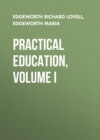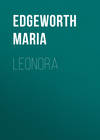Buch lesen: «The Parent's Assistant; Or, Stories for Children», Seite 29
'Take them, then,' said Carlo; 'I wish all Naples could see them, provided they might be liked half as well as I like them.'
Arthur carried off the drawings, and one day, when his master was better than usual, and when he was at leisure, eating a dessert of Francisco's grapes, he entered respectfully, with his little portfolio under his arm, and begged permission to show his master a few drawings done by the gardener's son, whose grapes he was eating.
Though not quite so partial a judge as the enthusiastic Carlo, this gentleman was both pleased and surprised at the sight of these drawings, considering how short a time Francisco had applied himself to this art, and what slight instructions he had received. Arthur was desired to summon the young artist. Francisco's honest, open manner, joined to the proofs he had given of his abilities, and the character Arthur gave him for strict honesty, and constant kindness to his parents, interested Mr. Lee, the name of this English gentleman, much in his favour. Mr. Lee was at this time in treaty with an Italian painter, whom he wished to engage to copy for him exactly some of the cornices, mouldings, tablets, and antique ornaments which are to be seen amongst the ruins of the ancient city of Herculaneum.29 About the same time, in a pit in the town of Portici, a similar passage under ground was discovered, and, by orders of the King of Naples, workmen were employed to dig away the earth, and clear the passages. They found, at length, the entrance into the town, which, during the reign of Titus, was buried under lava. It was about eighty-eight Neapolitan palms (a palm contains near nine inches) below the top of the pit. The workmen, as they cleared the passages, marked their way with chalk when they came to any turning, lest they should lose themselves. The streets branched out in many directions, and, lying across them, the workmen often found large pieces of timber, beams, and rafters; some broken in the fall, others entire. These beams and rafters are burned quite black, and look like charcoal, except those that were found in moist places, which have more the colour of rotten wood, and which are like a soft paste, into which you might run your hand. The walls of the houses slant, some one way, some another, and some are upright. Several magnificent buildings of brick, faced with marble of different colours, are partly seen, where the workmen have cleared away the earth and lava with which they were encrusted. Columns of red and white marble, and flights of marble steps, are seen in different places; and out of the ruins of the palaces some very fine statues and pictures have been dug. Foreigners who visit Naples are very curious to see this subterraneous city, and are desirous to carry with them into their own country some proofs of their having examined this wonderful place.
30
'I defy the furrier and you too,' replied Piedro, taking up his own ragged hat. 'I have no need to steal hats; I can afford to buy better than you'll have upon your head. Francisco, a word with you, if you have done crying at the pitiful story you have been listening to so attentively.'
'And what would you say to me?' said Francisco, following him a few steps. 'Do not detain me long, because my friends will wait for me.'
'If they are friends, they can wait,' said Piedro. 'You need not be ashamed of being seen in my company now, I can tell you; for I am, as I always told you I should be, the richest man of the two.'
'Rich! you rich?' cried Francisco. 'Well, then, it was impossible you could mean to trick that poor man out of his good hat.'
'Impossible!' said Piedro. Francisco did not consider that those who have habits of pilfering continue to practise them often, when the poverty which first tempted them to dishonesty ceases. 'Impossible! You stare when I tell you I am rich; but the thing is so. Moreover, I am well with my father at home. I have friends in Naples, and I call myself Piedro the Lucky. Look you here,' said he, producing an old gold coin. 'This does not smell of fish, does it? My father is no longer a fisherman, nor I either. Neither do I sell sugar-plums to children; nor do I slave myself in a vineyard, like some folks; but fortune, when I least expected it, has stood my friend. I have many pieces of gold like this. Digging in my father's garden, it was my luck to come to an old Roman vessel full of gold. I have this day agreed for a house in Naples for my father. We shall live, whilst we can afford it, like great folks, you will see; and I shall enjoy the envy that will be felt by some of my old friends, the little Neapolitan merchants, who will change their note when they see my change of fortune. What say you to all this, Francisco the Honest?'
'That I wish you joy of your prosperity, and hope you may enjoy it long and well.'
'Well, no doubt of that. Every one who has it enjoys it well. He always dances well to whom fortune pipes.'31
'Yes, no longer pipe, no longer dance,' replied Francisco; and here they parted; for Piedro walked away abruptly, much mortified to perceive that his prosperity did not excite much envy, or command any additional respect from Francisco.
'I would rather,' said Francisco, when he returned to Carlo and Rosetta, who waited for him under the portico, when he left them – 'I would rather have such good friends as you, Carlo and Arthur, and some more I could name, and, besides that, have a clear conscience, and work honestly for my bread, than be as lucky as Piedro. Do you know he has found a treasure, he says, in his father's garden – a vase full of gold? He showed me one of the gold pieces.'
'Much good may they do him. I hope he came honestly by them,' said Carlo; 'but ever since the affair of the double measure, I suspect double-dealing always from him. It is not our affair, however. Let him make himself happy his way, and we ours.
All Piedro's neighbours did not follow this peaceable maxim; for when he and his father began to circulate the story of the treasure found in the garden, the village of Resina did not give them implicit faith. People nodded and whispered, and shrugged their shoulders; then crossed themselves and declared that they would not, for all the riches of Naples, change places with either Piedro or his father. Regardless, or pretending to be regardless, of these suspicions, Piedro and his father persisted in their assertions. The fishing-nets were sold, and everything in their cottage was disposed of; they left Resina, went to live at Naples, and, after a few weeks, the matter began to be almost forgotten in the village.
The old gardener, Francisco's father, was one of those who endeavoured to think the best; and all that he said upon the subject was, that he would not exchange Francisco the Honest for Piedro the Lucky; that one can't judge of the day till one sees the evening as well as the morning.33
Not to leave our readers longer in suspense, we must inform them that the peasants of Resina were right in their suspicions. Piedro had never found any treasure in his father's garden, but he came by his gold in the following manner: —
After he was banished from the little wood-market for stealing Rosetta's basketful of wood, after he had cheated the poor woman, who let glasses out to hire, out of the value of the glasses which he broke, and, in short, after he had entirely lost his credit with all who knew him, he roamed about the streets of Naples, reckless of what became of him.
He found the truth of the proverb, 'that credit lost is like a Venice glass broken – it can't be mended again.' The few shillings which he had in his pocket supplied him with food for a few days. At last he was glad to be employed by one of the peasants who came to Naples to load their asses with manure out of the streets. They often follow very early in the morning, or during the night-time, the trace of carriages that are gone, or that are returning from the opera; and Piedro was one night at this work, when the horses of a nobleman's carriage took fright at the sudden blaze of some fireworks. The carriage was overturned near him; a lady was taken out of it, and was hurried by her attendants into a shop, where she stayed till her carriage was set to rights. She was too much alarmed for the first ten minutes after her accident to think of anything; but after some time, she perceived that she had lost a valuable diamond cross, which she had worn that night at the opera. She was uncertain where she had dropped it; the shop, the carriage, the street were searched for it in vain.
Piedro saw it fall as the lady was lifted out of the carriage, seized upon it, and carried it off. Ignorant as he was of the full value of what he had stolen, he knew not how to satisfy himself as to this point, without trusting some one with the secret.
After some hesitation, he determined to apply to a Jew, who, as it was whispered, was ready to buy everything that was offered to him for sale, without making any troublesome inquiries. It was late; he waited till the streets were cleared, and then knocked softly at the back door of the Jew's house. The person who opened the door for Piedro was his own father. Piedro started back; but his father had fast hold of him.
'What brings you here?' said the father, in a low voice, a voice which expressed fear and rage mixed.
'Only to ask my way – my shortest way,' stammered Piedro.
'No equivocations! Tell me what brings you here at this time of the night? I will know.'
Piedro, who felt himself in his father's grasp, and who knew that his father would certainly search him, to find out what he had brought to sell, thought it most prudent to produce the diamond cross. His father could but just see its lustre by the light of a dim lamp which hung over their heads in the gloomy passage in which they stood.
'You would have been duped, if you had gone to sell this to the Jew. It is well it has fallen into my hands. How came you by it?' Piedro answered that he had found it in the street. 'Go your ways home, then,' said the father; 'it is safe with me. Concern yourself no more about it.'
Piedro was not inclined thus to relinquish his booty, and he now thought proper to vary in his account of the manner in which he found the cross. He now confessed that it had dropped from the dress of a lady, whose carriage was overturned as she was coming home from the opera, and he concluded by saying that, if his father took his prize from him without giving him his share of the profits, he would go directly to the shop where the lady stopped whilst her servants were raising the carriage, and that he would give notice of his having found the cross.
Piedro's father saw that his smart son, though scarcely sixteen years of age, was a match for him in villainy. He promised him that he should have half of whatever the Jew would give for the diamonds, and Piedro insisted upon being present at the transaction.
We do not wish to lay open to our young readers scenes of iniquity. It is sufficient to say that the Jew, who was a man old in all the arts of villainy, contrived to cheat both his associates, and obtained the diamond cross for less than half its value. The matter was managed so that the transaction remained undiscovered. The lady who lost the cross, after making fruitless inquiries, gave up the search, and Piedro and his father rejoiced in the success of their manœuvres.
It is said that 'Ill-gotten wealth is quickly spent';34 and so it proved in this instance. Both father and son lived a riotous life as long as their money lasted, and it did not last many months. What his bad education began, bad company finished, and Piedro's mind was completely ruined by the associates with whom he became connected during what he called his prosperity. When his money was at an end, these unprincipled friends began to look cold upon him, and at last plainly told him – 'If you mean to live with us, you must live as we do.' They lived by robbery.
Piedro, though familiarised to the idea of fraud, was shocked at the thought of becoming a robber by profession. How difficult it is to stop in the career of vice! Whether Piedro had power to stop, or whether he was hurried on by his associates, we shall, for the present, leave in doubt.
About 1700 years ago, during the reign of the Roman Emperor Titus, there happened a terrible eruption of Mount Vesuvius; and a large city called Herculaneum, which was situated at about four miles' distance from the volcano, was overwhelmed by the streams of lava which poured into it, filled up the streets, and quickly covered over the tops of the houses, so that the whole was no more visible. It remained for many years buried. The lava which covered it became in time fit for vegetation, plants grew there, a new soil was formed, and a new town called Portici was built over the place where Herculaneum formerly stood. The little village of Resina is also situated near the spot. About fifty years ago, in a poor man's garden at Resina, a hole in a well about thirty feet below the surface of the earth was observed. Some persons had the curiosity to enter into this hole, and, after creeping underground for some time, they came to the foundations of houses. The peasants, inhabitants of the village, who had probably never heard of Herculaneum, were somewhat surprised at their discovery.
4242
Philosophical Transactions, vol. ix. p. 440.
Compute the morn and evening of their day. – Pope















